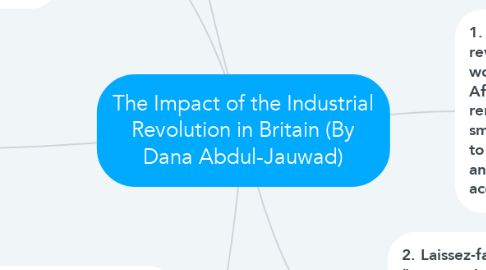The Impact of the Industrial Revolution in Britain (By Dana Abdul-Jauwad)
by Dana Abdul-Jauwad

1. 3. Trade unions: The working class became increasingly involved in politics. To vouch for reforms, they joined together in labor associations called unions. Workers bargained with factory owners for better working conditions and higher pay. If the factory owners refused such things, the workers would go on a strike. By 1875, British trade unions had won the right to go on strike peacefully.
2. 4. Reform laws: As a result of trade unions, many laws were put into place, such as the Health and Morals of Apprentices Act in 1802 that limited working hours to 12 per day with no night work allowed, and made it mandatory for employers to provide education, accommodation and decent clothing for workers. Inspectors were to enforce the Act.
3. 5. Many jobs were created for workers as a result of the Industrial Revolution, which contributed to the wealth of the nation. This period of time also fostered technological progress and encouraged inventors to innovate. The production of goods was increased, and laborers eventually won the right to higher wages, shorter working hours, and better working conditions.
4. 6. There are many long-lasting effects of the revolution that can be seen today, too. Most people nowadays can afford what many back in the day considered to be luxury items. Living and working conditions were improved greatly, and taxes brought in from the industry are invested in the betterment of the nation (e.g. investments in infrastructure).
5. 1. Urbanization: Before the industrial revolution, most people lived in small villages, working either in agriculture or as craftsmen. After the revolution, many farmers were rendered jobless, and handy machines made small hand weavers impractical. Many moved to large cities to find jobs at nearby factories, and many new factories/cities were built to accommodate the population.
6. 2. Laissez-faire Economy: Also referred to as "pure capitalism", this new economy allowed factory owners and others who controlled the means of production to become extremely rich extremely fast. Essentially, the rich got richer and the poor became even poorer. Class tensions grew, as, in the past, landowners and aristocrats had occupied the top position in British society. Some factory owners, merchants, and bankers grew wealthier than them.


